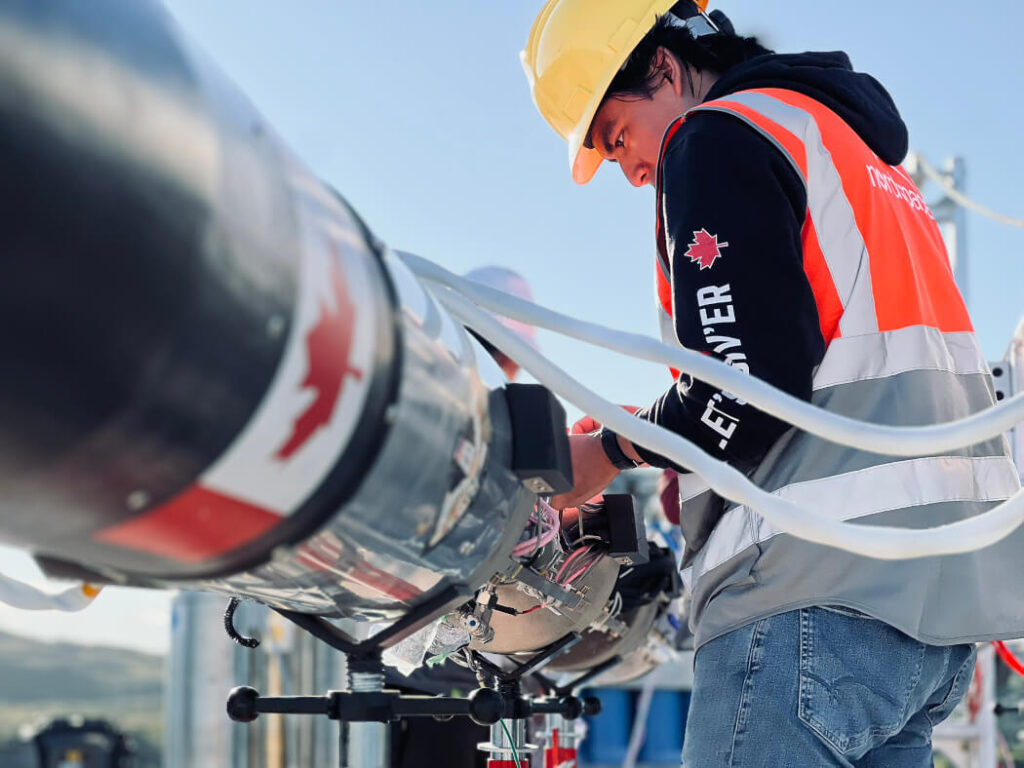Attempt at delivering the first Canadian commercial rocket launch delayed until at least September.
After two years of designing, building, and testing, NordSpace was just 58 seconds away from its dream of flight. That dream will have to wait a little longer.
The Markham, Ont.-based aerospace startup was forced to delay the first suborbital flight of its Taiga rocket today, which would have marked the first-ever commercial rocket launch from Canadian soil.
“It happens! It’s literally rocket science.”
Rahul Goel
NordSpace CEO
An erroneous trigger of the rocket’s ignition safety system just under a minute from takeoff was the last and final setback that pushed NordSpace outside of its planned launch window. With a launch license expiring this evening, the company posted to social media that it would be taking “a few days to rest” before starting the process again.
“It happens! It’s literally rocket science,” NordSpace CEO Rahul Goel told BetaKit. “Most companies never share their challenges or failures but we try to be super transparent.”
The CEO added that NordSpace plans for another attempt in September.
The Taiga rocket was set to take off from NordSpace’s under-construction Atlantic Spaceport Complex (ASX), which the company broke ground on two weeks ago. The ASX, located just outside of the small town of St. Lawrence, Nfld., could become Canada’s first operational commercial spaceport.
NordSpace said the launch would have been both the first commercial liquid rocket launch in Canadian history, and the first commercial launch from a private Canadian spaceport. The 17-foot-tall Taiga rocket is powered by NordSpace’s 3D-printed liquid rocket Hadfield Engine, named after Canadian astronaut Chris Hadfield, who turned 66 today.
(Image courtesy NordSpace)
The delay followed multiple scrubbed attempts throughout the week. The mission’s first launch window opened Aug. 25, but was pushed back several times due to weather conditions, including the effects of Hurricane Erin.
NordSpace attempted launches twice on Friday, but was ultimately thwarted by the faulty misfire detection system. Other setbacks included an issue with the rocket’s nitrogen quick disconnect mechanism (a fitting that attaches to a flight tank with pressurized fluid).
The Taiga launch has been in the works for over a year, as NordSpace secured approvals from governing agencies such as Transport Canada and the Newfoundland and Labrador Departments of Fisheries. The inaugural mission is named “Getting Screeched In”—an ode to the Newfoundland tradition that welcomes “mainlanders” to the culture by inviting them to take a shot of screech (a local rum), kiss a cod, and recite island slang.
RELATED: How Canada can be a leader in space (and save the world)
Founded in 2022 by Goel, NordSpace aims to develop space launch vehicles, spaceports, and satellites entirely in Canada. Part of the company’s mission is to foster Canada’s space mission capacity, including satellites and robotics for orbiting the Earth and the moon. NordSpace argues that developing this technology will propel Canada back into the space race, aiding its security and sovereignty.
NordSpace was featured in BetaKit Most Ambitious for its mission to facilitate Canada’s first commercial space launch, but it is not the only Canadian company building spaceflight capacity. Earlier this month, Montréal-based defence and aerospace company Reaction Dynamics signed an agreement with Halifax-based Maritime Launch Services (MLS) to launch a rocket into orbit in 2028 from a planned Spaceport Nova Scotia facility. The agreement included a $1-million equity investment from Reaction Dynamics into MLS.
NordSpace plans to develop permanent infrastructure for the Atlantic spaceport to support larger vehicles on future missions. Future planned launches include another suborbital trip next year and an orbital launch of its larger Tundra rocket in 2027.

